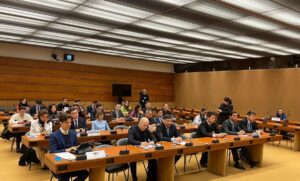ASTANA – On the margins of the 48th session of the Working Group of the UN Human Rights Council’s Universal Periodic Review, Kazakhstan’s delegation informed the international human rights community about the country’s democratic transformation with an emphasis on political and social reforms on Jan. 22 in Geneva.

Representatives of 40 UN member states and international non-governmental organizations accredited in Geneva attended the event. Photo credit: Kazakh Foreign Ministry.
Representatives of 40 UN member states and international non-governmental organizations accredited in Geneva attended the event, reported the Kazakh Foreign Ministry’s press service.
Kazakh officials highlighted the adoption of legislative measures to combat domestic violence, and promote gender equality and inclusion in all spheres of life, including the representation of women in public service.
Particular emphasis was devoted to enlarging the Mazhilis’ mandate and adopting a 30% quota for women, youth, and people with disabilities in Kazakhstan’s Parliament, which ensures broader and more varied representation in the legislative process.
Kazakh Commissioner for Children’s Rights Dinara Zakiyeva pointed out the measures taken by the state to strengthen the mandate of the commissioner to protect children from bullying and suicide, sexual violence and early marriage. Zakiyeva also noted the country’s efforts to ensure a safe, educational process for children, notably, the introduction of courses in schools related to personal safety at home, on the street, at school and on the internet, and the launch of an anti-bullying program in Kazakhstan
Dinara Yessimova, a civil sector representative, gave information on the National Association of Social Workers of Kazakhstan’s vital contribution to guaranteeing human rights and supporting socio-economic development following the United Nations Sustainable Development Goals. She cited the professional standard on social work and other social professions developed in 2023 in collaboration with the Kazakh Ministry of Labor and Social Protection of the Population, as well as an online training course for over 30,000 people with disabilities, as concrete examples of the work.
The UN Geneva audience expressed interest in learning from Kazakhstan’s experience, notably on gender equality, the role of Parliament in ensuring human rights and freedoms, especially for the most vulnerable groups, and the accountability of the government and national human rights institutions to the people’s elected representatives.
The session of the Universal Periodic Review Working Group to discuss Kazakhstan’s fulfillment of its human rights obligations will take place on Jan. 23. As a result, the UN Human Rights Council will present a report on the human rights situation in Kazakhstan, which will also include the recommendations of UN member states.
The Universal Periodic Review is a unique mechanism of the UN Human Rights Council that calls on all member states to undergo a peer review of their human rights situation every 4.5 years.
Established in March 2006 by UN General Assembly resolution 60/251, the Universal Periodic Review is designed to stimulate, support and enhance the promotion and protection of human rights in every country.
